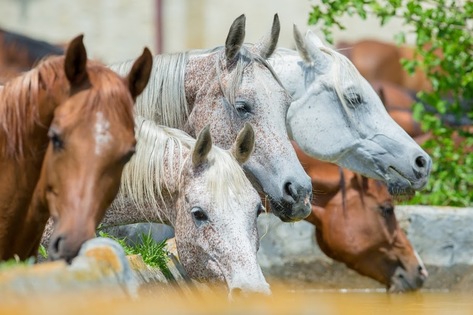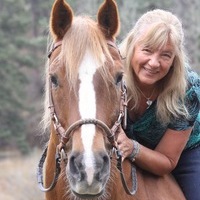My own horses will eat anything that doesn’t move too quickly, but what do you do for the picky eaters, or the horses that seem not to care about food, so struggle to keep at a decent weight?
First, figure out if there is a good reason for the lack of interest in food.
-
Have your vet out for a dental exam to eliminate teeth issues. Older horses need to be examined once or twice a year.
-
While the vet is onsite, have a general health exam done.
-
Pull a fecal sample and send to the lab to look for parasites or other maladies.
-
Look for injury on horse
-
Check for ulcers—both gastric and oral. Gastric ulcer exam does require the horse be scoped, so talk to your vet about doing that, but there are some palpation points you can try, too. Go to YouTube and search for Dr Mark DePaolo and equine ulcer diagnosis. Not 100% conclusive, but I’ve had decent luck with determining if a cop is necessary.
-
Check for inflammation of the esophagus (vet must do this, obviously).
-
Check Vitamin B levels; too low, he’ll lose his appetite. To remedy, give an oral B supplement for two to three weeks only, then recheck. Again, your veterinarian can help with this.
-
Consider there may be a hind gut disturbance, and talk to your vet about how to remedy; usually a prebiotic or probiotic will help.
Once the medical reasons are ruled out as cause for your horse having no interest in food, look at his environment.
-
Is he allowed adequate turnout?
-
Does he have time with equine buddies?
-
Is he getting exercised regularly?
-
Is his stress level high?
-
Does he seem anxious and worried?
-
Are his feed manger and water trough clean? Palatability is everything!
-
Does he have the correct kind of salt offered 24/7?
-
Is the hay being fed high quality? Is it coarse or dirty? This can cause esophageal abrasions.
-
Do you feed electrolytes? Too high and horse will lose appetite.
-
Is he fed on the ground and is ingesting too much dirt, gravel or sand?
-
Does he spend a few hours a day at minimum outside, under the sun?
-
Is his feed ration balanced? If you aren’t sure, ask your vet to help determine what changes should be made, or, go to the link below and I’ll give you the formula!
-
If he’s thin or older, and it’s cold, do you blanket him? Maintaining body temperature takes a lot of calories and sometimes when chilled, horses don’t eat or drink as much.
-
If it’s hot where you live, is he overheated and drinking so much that his stomach feels full and he doesn’t want to eat? If so, try a cooling sheet and a fan, or spray him off periodically and remember to use a sweat scraper to remove excess water or he’ll be even hotter.
There are some things you can do on your own, without the use of a veterinarian to see if it helps.
-
Deworm him using the correct chemical for the area and season. If you are able, have a fecal exam run first and you’ll save the stabbing in the dark process. If you take a sample in, these are generally less than $30.
-
Feed him more often, or offer free-feed hay 24/7.
-
Make all feed changes slowly. Two weeks to add something new, three or four to change over completely.
-
Diet: 30% forage/roughage of alfalfa to increase the calories, and fill out the balance with good grass hay. Alfalfa has a higher calcium content than grass hays and this helps to buffer the stomach acid. Don’t overdo it and ease into the change very slowly—over a two to four week timeline at least.
-
Increase his fiber without adding much starch. Rice bran, beet pulp and a ration balancer can help.
-
Add a senior feed to diet, but not all in one meal. Spreading out this concentrated feed over three or four feedings is much better for your horse.
-
In crease the fat content in his diet by adding things like ground flax seed, ground soy, or flax seed oil, rice bran, sunflower oil or corn oil, though corn oil is not my first choice.
-
Make his food taste better! Add honey; bonus: if local, you are also helping his immune system. Applesauce, apple juice, carrot juice, chopped carrots or apples, bananas, cherry juice (sparingly) peppermint, oregano or cumin can also be appealing to a horse. Don’t add all of these things, start with one and find which he most loves.
-
An old remedy is to add a bottle of stout Guinness over his feed and he’ll get some yeasts and other things that stimulate his appetite. Do this sparingly and not forever, but it’s worth a try for a week, maybe?
Some horses will develop scours if on a high grain or high fructose diet. To remedy, cut back on the amount per feeding and increase the number of feedings per day. Add in well-cured hay (like last year’s barn-stored high quality grass hay) to round out his roughage intake. If he’s been on any antibiotics recently, you may want to give him a good probiotic as directed by your vet or nutritionist. Oddly, the Guinness beer may also help here as well. Who knew?
If you’d like to keep in touch or want to contact me directly, sign up here and be assured that I’ll send you very few direct emails and each will always include some FREE goody! Just click the very long link below and Welcome!
https://visitor.r20.constantcontact.com/d.jsp?llr=znqbxz5ab&p=oi&m=znqbxz5ab&sit=8pwizjknb&f=0ed17290-b3e1-4adc-b99b-7d1652270a31
***This article is not written to offer any legal, medical, or professional advice and should not be construed as veterinary advisory recommendation to you or anyone else. Please obtain professional instruction from a qualified person in regard to your own objectives and needs.
Keep on loving your Horses, Happily Ever After!
~Tanya Buck
HorsesHappilyEverAfter.com



